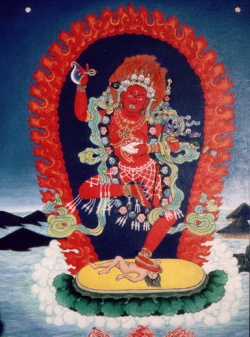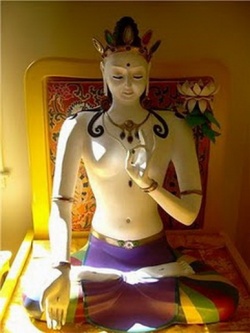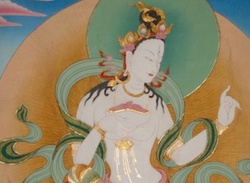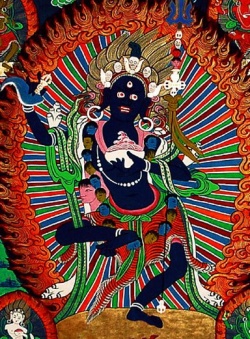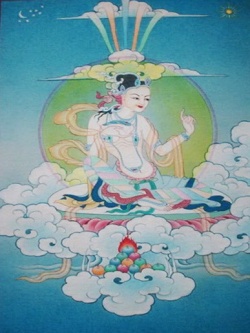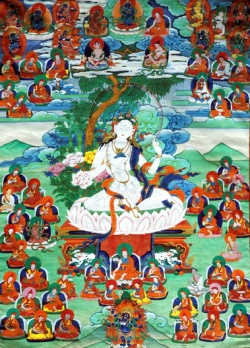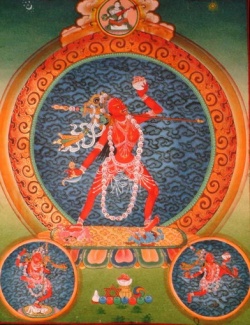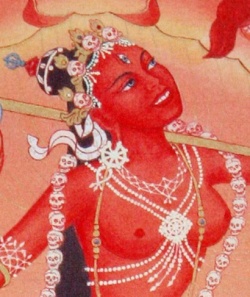Tibetan Goddess Names
A Tibetan mother goddess.
Buddhi
One of the agents of reincarnation.
==Brag-srin-mo==
The ancestral goddess of Tibet.
She mated with a monkey and bore six children.
Those children were fed a special food, causing them to shed their tails and fur. They would become the first Tibetans.
Dakinis, the
(Kadomas, the) The five orders of Tantric goddesses who preside over various psychic forces invoked in Tantric Yoga rituals.
The Vajra (Divine) Dakinis represent East, peacableness and love, their colours are white or blue.
The Ratna (Precious) Dakinis represent South, grandness and compassion, their colour is yellow.
The Padma (Lotus) Dakinis represent West, fascination and affection, their colour is red.
The Karma (Action) Dakinis represent North, sternness and impartiality, their colour is green.
The Buddha (Understanding) Dakinis represent the Centre, enlightenment, and their colour is dark blue. They are described as majestically beautiful and graceful.
==Dolma==
(White Tara) One of the most accessible and popular figures in the Tibetan Pantheon, her aspects range from trancendental wisdom to the erotic.
She is depicted according to her aspects - riding a lion with the sun in her hand; under a starry sky on a lotus throne; as an attractive, lightly clad woman wearing a tiara and clasping a lotus blossom in her left hand, her right hand extended in a gesture of giving.
She is known as 'the Tara with the Seven Eyes'.
Dorjne-Naljorma
(Vajra-Yogini) The chief tutelary goddess of the practices of Tibetan Tantric yoga.
She is the personificaiton of spiritual energy and feminine occult power, psychic heat and the Kundalini force.
She is visualized as bright ruby red (the Radiance of Wisdom), nude, with three eyes, dancing with one foot on the chest of a prostrate human form.
She wears the Halo of the Flames of Wisdom.
==Gokarmo==
('She of the White Raiment') A form of the mother goddess.
==Gu-Lang==
A Tibetan and Nepalese goddess of the Brahmins, the protectress of mothers and children.
Ekadzati
The goddess of the mystic cults and of wisdom. She is depicted with a singular eye.
==Hariti==
She was a cannibal of children until her conversion to Buddhism (by the Buddha), she then became the protectress of children.
==Keyuri==
A Tibetan and Hindu cemetary goddess.
==Khados==, the
Regarded as primordial women who were 'entirely human and fair to look upon'; taken as wives by an earlier race of men. They were ver kind to mortals, and had the ability to walk on air.
==Khon-Ma==
The Tibetan Mother of Fiends, she controls innumerable Earth-demons. She must be propitiated in complicated ways to ensure protection of the household.
==Kurukulla==
Dances the Rhythms of Wisdom...and connotes both carnal and spiritual love (the two are mystically the same in Tibetan tantra). She dances upon and suppresses the demon Rahu (representing Ignorance). Her bow and arrow pierce through difficulties; her lower right hand offers the mudra of reassurance. She promotes wealth and well-being for her devotees.
Lasya
(Lasema, Sgeg-Mo-Ma) A Tibetan goddess of beauty, depicted holding a mirror.
==Nguntre==
One of three creator goddesses. The other two are Ui Tango and Ninguerre.
==Ninguerre==
One of three creator goddesses. The other two are Nguntre and Ui Tango
==Prajnaparamita==
The Female Buddha, Her grace embodies the feminine aspect of the supreme Buddha and offers a sublime metaphor for your own meditation.
She is Goddess of Transcendental Wisdom, similar in importance to Saviouress and Mother Goddess Tara.
==Samanta-Bhadra==
Sanskrit name of Kuntu-bzang-mo, mother goddess in Bardo mysticism.
==Sangs-rygas-mkhá==
A rain goddess.
==Sengdroma==
Goddess called upon as a protector of herds, often depicted with the face of a lion
.
==Sgeg-mo-ma==
Goddess of beauty, often depicted holding a mirror
==Tara==
Tara is the Mother Goddess who answers human supplication.
The shining figure Sita Tara was born of a single tear of compassion shed by Avalokiteshwara on seeing the suffering of humanity.
Tibetan Buddhism numbers 21 Taras, often featuring seven all-seeing eyes of compassion (three in the forehead, one in each palm and foot sole).
Red Tara transforms suffering into healing and courage. White Tara promises, the mild form of the goddess, health, long life and prosperity.
Green Tara promotes growth, solves practical problems and protects our everyday world.
Black and Red Taras are fiercer guises. Here the deity may use suffering to foster the devotee's healing and courage.
But even in Her wrathful aspect, Tara's role is to dispel the fear of death and foster the evolution of compassion. Tara brings the Wisdom of Compassion.
==Tho-og==
The Mother goddess, first of the gods to exist.
==Ui Tango==
One of three creator goddesses. The other two are Nguntre and Ninguerre.
==Yum-chen-mo==
Goddess of wisdom.
==Zas-ster-ma-dmar-mo==
Goddess of wealth.
==Palden Lhamo==
==Vajrayogini==
==Vajravārāhī==
==Simhamukha==
In Hindu mythology, Tara was an astral goddess who was the wife of Brihaspati.
A heavenly adventure was played out in the night sky when Soma, the moon, lusted after and abducted Tara, who was the pole star, from Brihaspati, the planet Jupiter.
Soma kept Tara hostage, not releasing her at either the urging of Brihaspati or even Brahma.
The gods rallied against Soma, who called on the asuras to be his allies, and a mighty war erupted.
Before both sides could wipe each other out, Brahma again tried to intervene, and this time Soma listened and freed his captive.
She returned to her husband, but she was pregnant, and would not say who the father was.
Brihaspati refused to accept her back until the child was born.
At that moment, the child heard the ultimatum and was born instantly. He was brimming with power and beauty, and both Soma and Brihaspati claimed the child as his own son.
The boy grew weary of the bickering over him, and was ready to utter a curse, but Brahma once again came to the rescue.
He calmed the child down, then gently asked Tara who the father was.
Tara confessed that it was Soma. Soma welcomed his son and named him Buddha, who became the planet Mercury.
